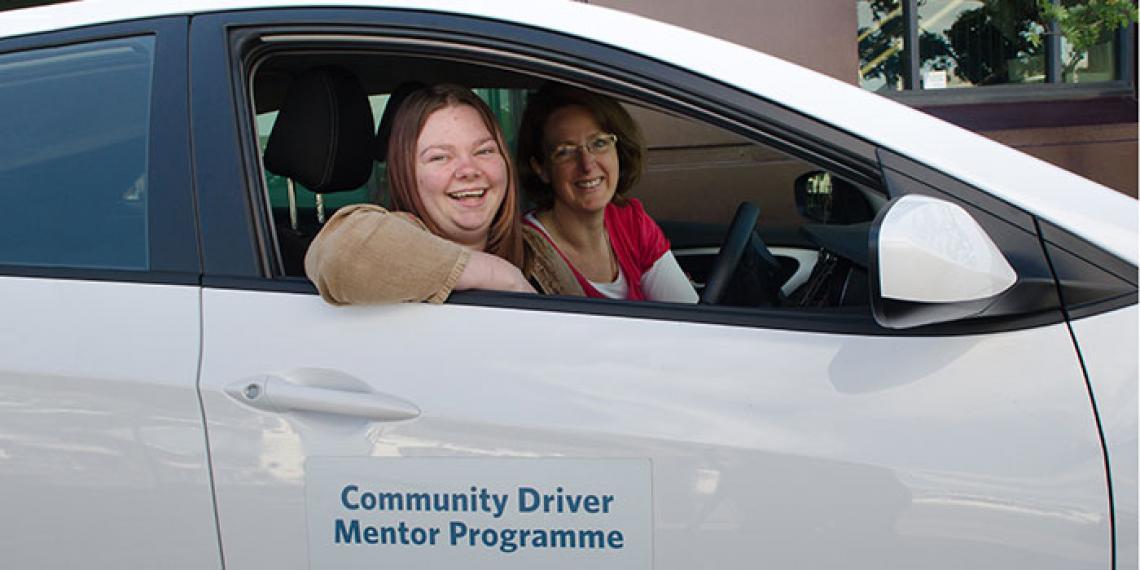You are here
Rebuild Work Extends to Driver Mentoring

A Salvation Army course training people to work in the Canterbury rebuild has led to a programme mentoring young drivers.
The Salvation Army Education and Employment programme ‘U Build 4 the Rebuild’ has been running since June 2012, funded by money set aside from The Salvation Army Canterbury Earthquake Appeal to support the Canterbury Rebuild.
UBuild has trained more than 200 people to work in civil infrastructure such as water, roading and sewer repairs, and building and painting.
Project manager Robyn Laurenson said UBuild was also invited to host the NZTA-approved Community Drive and Mentoring programme—training and providing mentors who spend 12 weeks with a young person aged 16-24, helping them get their restricted driver licence.
U Build was invited to host the course while helping civil infrastructure course trainees get their full driver licence. A full licence is a requirement for the ‘wheels, tracks and rollers’ licence, enabling workers to legally drive construction equipment.
When they began offering the course, they also approached the Public Defence Service about offering the course to young people who were before the court with repeated driving fines.
A classic case was Paul*, who lost his learner licence last year and was then caught driving while disqualified. Course coordinator Keran Tsering attended court to support Paul, and the Police agreed to defer the charges if he completed the mentoring course.
The hope is that the course would keep other young people like Paul from further criminal convictions, helping them break old habits and setting them up for a better future.
Karen first visited U Build to support her Tibetan husband and another Tibetan man complete one of its courses despite their limited English. When it came to finding someone to run the Community Driver Mentoring programme, Keran was top of the list and had been ‘an awesome fit’, Robyn says. ‘She’s been brilliant. She is achieving a 98 per cent pass rate first time. The national average is 55 per cent.’
Spending 12 weeks with a young person is a great opportunity to support them with more than just driving, Robyn explains. ‘The young girl I mentor lives with her mother, who suffers from mental illness. I have been able to support her to get in touch with the mental health foundation. After years of feeling like she has been dealing with this on her own she has a family support person who listens and supports her.’
The transformations seen from Community Driver Mentoring matched changes seen in trainees on other U Build courses, and working with them was a privilege, Robyn said.
U Build courses are intensive six-week courses, with tutors covering a ‘ready-to-work’ component, technical skills and qualifications, site safe and first aid. Courses have seven or eight trainees on average. From the 140 graduates on the civil infrastructure course, U Build has seen about 80 per cent success in trainees gaining employment.
Its tutors work with trainees on interview skills, CV writing and job searching. Robyn also aims to include a weekly one-on-one session with each trainee, talking about their challenges and barriers into work, along with any issues they might be having in their personal lives. Trainees also develop life skills through weekly group lunches, where teams cook lunch for everyone (making something they can cook the night before and take to work) and working out how much it costs per head.
Robyn reminds trainees that their course is paid for by generous donations to The Salvation Army Canterbury Earthquake Fund, emphasising the hope that they would find jobs within Christchurch. She says their trainees have made a real difference to the rebuild.
Initially, Robyn thought U Build courses would attract younger people. In fact, most of their trainees have been over 35, with many hoping to gain their first qualifications and a fresh start and a new career.
One trainee ended up homeless, but with the support of the course and other agencies she was able to get back into a home and work, Robyn said.
‘We’ve had people with criminal histories—a big part of this is coaching them how to talk to employers about their histories. We had an ex-gang member with a full face moko who was very well spoken on the phone, but when employers saw him they wouldn’t employ him. On Christmas Day I got a text from him saying, “Thank you for believing in me.” It’s this transformational stuff that the Sallies do so well.’
* not his real name
by Robin Raymond (c) 'War Cry' magazine, 2 May 2015, pp19.
You can read 'War Cry' at your nearest Salvation Army church or centre, or subscribe through Salvationist Resources.